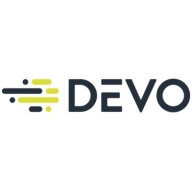


Find out what your peers are saying about Splunk, Wazuh, Microsoft and others in Security Information and Event Management (SIEM).



Devo is the only cloud-native logging and security analytics platform that releases the full potential of all your data to empower bold, confident action when it matters most. Only the Devo platform delivers the powerful combination of real-time visibility, high-performance analytics, scalability, multitenancy, and low TCO crucial for monitoring and securing business operations as enterprises accelerate their shift to the cloud.
IBM Security QRadar (recently acquired by Palo Alto Networks) is a security and analytics platform designed to defend against threats and scale security operations. This is done through integrated visibility, investigation, detection, and response. QRadar empowers security groups with actionable insights into high-priority threats by providing visibility into enterprise security data. Through centralized visibility, security teams and analysts can determine their security stance, which areas pose a potential threat, and which areas are critical. This will help streamline workflows by eliminating the need to pivot between tools.
IBM Security QRadar is built to address a wide range of security issues and can be easily scaled with minimal customization effort required. As data is ingested, QRadar administers automated, real-time security intelligence to swiftly and precisely discover and prioritize threats. The platform will issue alerts with actionable, rich context into developing threats. Security teams and analysts can then rapidly respond to minimize the attackers' strike. The solution will provide a complete view of activity in both cloud-based and on-premise environments as a large amount of data is ingested throughout the enterprise. Additionally, QRadar’s anomaly detection intelligence enables security teams to identify any user behavior changes that could be indicators of potential threats.
IBM QRadar Log Manager
To better help organizations protect themselves against potential security threats, attacks, and breaches, IBM QRadar Log Manager gathers, analyzes, preserves, and reports on security log events using QRadar Sense Analytics. All operating systems and applications, servers, devices, and applications are converted into searchable and actionable intelligent data. QRadar Log Manager then helps organizations meet compliance reporting and monitoring requirements, which can be further upgraded to QRadar SIEM for a more superior level of threat protection.
Some of QRadar Log Manager’s key features include:
Reviews from Real Users
IBM Security QRadar is a solution of choice among users because it provides a complete solution for security teams by integrating network analysis, log management, user behavior analytics, threat intelligence, and AI-powered investigations into a single solution. Users particularly like having a single window into their network and its ability to be used for larger enterprises.
Simon T., a cyber security services operations manager at an aerospace/defense firm, notes, "The most valuable thing about QRadar is that you have a single window into your network, SIEM, network flows, and risk management of your assets. If you use Splunk, for instance, then you still need a full packet capture solution, whereas the full packet capture solution is integrated within QRadar. Its application ecosystem makes it very powerful in terms of doing analysis."
A management executive at a security firm says, "What we like about QRadar and the models that IBM has, is it can go from a small-to-medium enterprise to a larger organization, and it gives you the same value."
Splunk Enterprise Security is widely used for security operations, including threat detection, incident response, and log monitoring. It centralizes log management, offers security analytics, and ensures compliance, enhancing the overall security posture of organizations.
Companies leverage Splunk Enterprise Security to monitor endpoints, networks, and users, detecting anomalies, brute force attacks, and unauthorized access. They use it for fraud detection, machine learning, and real-time alerts within their SOCs. The platform enhances visibility and correlates data from multiple sources to identify security threats efficiently. Key features include comprehensive dashboards, excellent reporting capabilities, robust log aggregation, and flexible data ingestion. Users appreciate its SIEM capabilities, threat intelligence, risk-based alerting, and correlation searches. Highly scalable and stable, it suits multi-cloud environments, reducing alert volumes and speeding up investigations.
What are the key features?Splunk Enterprise Security is implemented across industries like finance, healthcare, and retail. Financial institutions use it for fraud detection and compliance, while healthcare organizations leverage its capabilities to safeguard patient data. Retailers deploy it to protect customer information and ensure secure transactions.